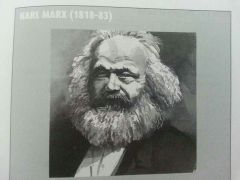![]()
![]()
![]()
Use LEFT and RIGHT arrow keys to navigate between flashcards;
Use UP and DOWN arrow keys to flip the card;
H to show hint;
A reads text to speech;
6 Cards in this Set
- Front
- Back
- 3rd side (hint)

Karl Marx
|
he developed the theory of historical progression to communism through class struggle.
|
|
|
|
Marx's historical materialism
|
materialism, in marxs time, reffered to the belief that the world is created by ideas, particularly religious ideas.
according to marx there are 3 main time periods of change that had occured in the way human societies are organised. he call them epochs. 1) classical societies of ancient rome. 2) middle ages. 3) capitalists society. according to Marx it is a conflict of the ownership of the means of production, that is class struggle, that causes change in society. |
bourgeois and the proletariat
|
|
|
The Labour theory of Value
|
the bourgeoisie is an immensely dynamic and creative class. they were the driving force behind the industrial revolution. but the bourgeoisie is only apart of the story as the proletariat were the ones who did the manual work for the industrial revolution to come alive.
|
|
|
|
Class consciousness
|
when the proletariat realise the exploitation and become revolutionary and overthrough the bourgeoisie.
|
|
|
|
the frankfurt school
|
identified ideology as a major source of domination in modern societies ans sought to show how it conceals and legitmates the power of the ruling class
|
|
|
|
habermas
|
he sees it as a crisis within the realm of ideas and state rather than within the economy.
his general belief is that non material factors such as ideas and language make a fundamental contribution to the STRUCTURE of society and need to be analaysed in their own right rather than reduced to a mere reflection of material force. |
against marx
|

